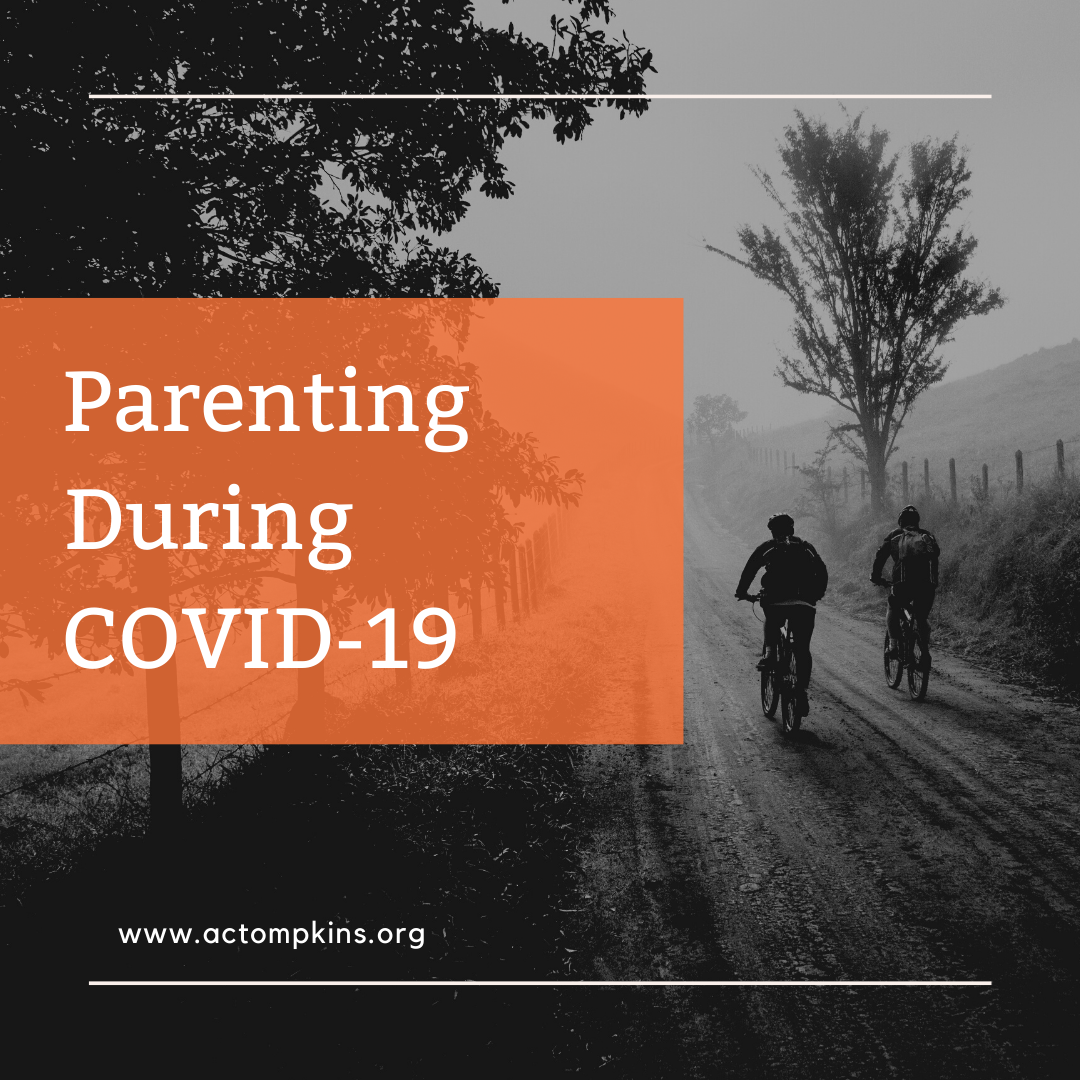Written by: Elicia Blodgett, Youth & Family Therapist at the Advocacy Center
Covid-19 is adding new and significant stressors to our lives: job insecurity, fear of falling ill, social isolation. For parents, there is the additional stress of having children at home 24/7, bored or anxious, and more than likely acting out or at least behaving differently than their norm. It’s enough to make any parent feel on edge or close to falling off the edge. For parents with trauma histories or currently in a domestic violence situation, these stressors may feel unbearable and unmanageable.
If one of your primary stressors is concerns about how to pay rent or how to provide food, there are resources available that may be able to help. 211 Tompkins/Cortland is a great place to start. Staff and volunteers can provide you with the most current list of resources based on your needs and circumstances. Also, for those who have or are currently experiencing abuse, Advocacy Center advocates are available to help you access these types of resources by calling the 24 hour hotline at 607-277-5000.
If you are feeling like you have all the practical issues somewhat handled, but really you just need some coping skills to help you regulate your emotions in this alarming time, this next part might help.
The Body Keeps The Score, by Bessel Van Der Kolk, a book about how trauma impacts the brain and the body, explains that the “most common response to stress is to seek out people we like and trust to help us and give us the courage to go on.” This may be increasingly challenging right now, but still important. For some, that may mean turning to friends or family for support during stressful or difficult times but for others there may be many reasons that family or friends are not the best options. It may be, as is the case for many people right now, your usual support people are themselves on edge. Maybe you are unsure how they will respond, or you think they will not be able to listen without judging or giving your advice when that isn’t what you need. Even in those cases, you are not alone.
In Tompkins County, we are fortunate to have a number of agencies that offer phone support. Calling a hotline may feel awkward, but there are benefits to talking with someone whose sole focus is listening and supporting you confidentially. In addition to the Advocacy Center Hotline, The CrisisLine of Suicide Prevention & Crisis Services at 607-272-1616 or 800-273-8255, and the NYS Emotional Support Helpline at 1-844-863-9314 are both staffed by trained crisis counselors who volunteer their time to offer support to those you call.
Another strategy you can try is to learn a couple quick and simple techniques to help relieve stress, anxiety, or the physical reactions to trauma triggers. These strategies often fall into 2 distinct categories-relaxation and grounding techniques. How can you relax or feel grounded in the middle of all this? It’s a fair question.
The answer is in the flip of a switch. For people who have experienced abuse, trauma or toxic stress, the brain’s default mode is often one of survival. The specifics of this default mode looks different for different people, but one commonality is often feeling overwhelmed or panicky when stressed or not in control. Feeling triggered can flip that survival switch to fight or flight mode, neither of which are favorable options when sheltering in place at home during Covid-19. Calming the physical tensions in our bodies can help flip the fight/flight switch off. Introducing relaxation or grounding methods can begin the process of retraining our brain.
For example, our brains cannot have both an anxiety response and an anxiety-inhibiting response (a relaxation technique) at the same time. This means if one is taking a deep breath, the anxiety is temporarily put on pause. That pause, that moment, can often be just what we need to interrupt our reactive brain (that is ready to explode) and activate our rational brain (that doesn’t want to take our fears/anger out on our kids, for example).
This breathe bubble video on youtube offers a 30-second break from overwhelming anxiety, fear, or anger. If you are still feeling anxious while breathing, notice if you are pausing your breath for those anxious moments. You may need to consciously re-focus on the breathing, repeatedly, to truly pause the anxiety or thought of the stressor. New York State has also partnered with the Headspace App to provide New Yorkers access to mindfulness and guided meditations free of charge: these may be worth checking out!
While relaxation techniques can be incredibly helpful to relieve the physical impacts of stress or anxiety, they may be less helpful for those having physical reactions due to trauma triggers. In those cases, using Grounding Strategies may be more useful. Grounding, a way to pull yourself back from unwanted emotions, flashbacks or memories, and to calm tensions in our body (or physiological reactions to unwanted feelings/ memories/ flashbacks). These exercises, as outlined in this guide, are simple and quick ways to bring you back to the moment and thus activate your rational mind.
Breathing, relaxation, and grounding exercises won’t solve the many problems that face us as parents during this extremely stressful time, but they can help us cope. Exploring which strategies feel best for you can help you develop a plan for responding to these stressors and triggers in ways that feel best. Feeling in control of ourselves offers positive mental and physical health benefits in a time of uncertainty and struggles for both ourselves and our children which can benefit our overall well-being.
